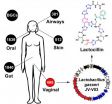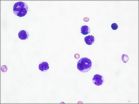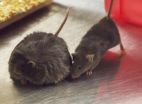(Press-News.org) Annual flu epidemics cause millions of cases of severe illness and up to half a million deaths every year around the world, despite widespread vaccination programs. A study published by Cell Press on September 11th in Immunity reveals that gut microbes play an important role in stimulating protective immune responses to the seasonal flu vaccine in mice, suggesting that differences in the composition of gut microbes in different populations may impact vaccine immunity. The study paves the way for global public health strategies to improve the effectiveness of the flu vaccine.
"Our findings raise the possibility that antibiotic treatment prior to or during vaccination may impact immunity," says senior study author Bali Pulendran of the Emory Vaccine Research Center. "Another potential implication of our study is that we may be able to manipulate gut microbes in order to improve immune responses to the vaccine."
Vaccines are less effective in many parts of developing countries compared to industrialized areas, and a significant proportion of vaccinated individuals, especially the young and elderly, remain susceptible to infection. The underlying reasons for the lack of complete protection have not been clear, in part because relatively little is known about how vaccines elicit host immune responses.
In a previous study, Pulendran and his team found that the antibody response in healthy human adults vaccinated with the seasonal flu vaccine, known as trivalent inactivated influenza vaccine (TIV), depended on expression of a gene called Toll-like receptor 5 (TLR5). Because this gene encodes a cell-surface receptor that detects bacterial flagellin—a protein that makes up the whip-like appendage that helps bacteria move—the researchers suspected that gut microbes may influence immunity to flu vaccination.
Pulendran and his collaborators tested this possibility in the new study. Upon vaccination with TIV, mice that were genetically manipulated to lack TLR5 showed significantly reduced antibody responses compared with normal mice. Moreover, mice that were either raised in a germ-free environment or treated with antibiotics showed lower vaccine-induced antibody levels compared with germ-exposed mice. TLR5-deficient mice also showed reduced antibody responses to the polio vaccine, which is composed of specific viral molecules rather than an active virus, similar to TIV.
Taken together, the findings suggest that the effectiveness of inactivated, subunit vaccines in eliciting protective immune responses strongly depends on gut microbes. "In the future, it will be important to determine the impact of antibiotic treatment on immunity to vaccination in humans and to study whether differences in the composition of gut microbes in different populations can impact vaccine immunity," Pulendran says.
INFORMATION:
Immunity, Oh et al.: "TLR5-mediated Sensing of Gut Microbiota Is Necessary for Rapid Induction and Persistence of Antibody Responses to Seasonal Influenza Vaccination."
Gut microbes determine how well the flu vaccine works
2014-09-11
ELSE PRESS RELEASES FROM THIS DATE:
Stem cells help researchers understand how schizophrenic brains function
2014-09-11
Using human induced pluripotent stem cells (hiPSCs), researchers have gained new insight into what may cause schizophrenia by revealing the altered patterns of neuronal signaling associated with this disease. They did so by exposing neurons derived from the hiPSCs of healthy individuals and of patients with schizophrenia to potassium chloride, which triggered these stem cells to release neurotransmitters, such as dopamine, that are crucial for brain function and are linked to various disorders. By discovering a simple method for stimulating hiPSCs to release neurotransmitters, ...
Intestinal bacteria needed for strong flu vaccine responses in mice
2014-09-11
Mice treated with antibiotics to remove most of their intestinal bacteria or raised under sterile conditions have impaired antibody responses to seasonal influenza vaccination, researchers have found.
The findings suggest that antibiotic treatment before or during vaccination may impair responses to certain vaccines in humans. The results may also help to explain why immunity induced by some vaccines varies in different parts of the world.
In a study to be published in Immunity, Bali Pulendran, PhD, and colleagues at Emory University demonstrate a dependency on gut ...
Our microbes are a rich source of drugs, UCSF researchers discover
2014-09-11
Bacteria that normally live in and upon us have genetic blueprints that enable them to make thousands of molecules that act like drugs, and some of these molecules might serve as the basis for new human therapeutics, according to UC San Francisco researchers who report their new discoveries in the September 11, 2014 issue of Cell.
The scientists purified and solved the structure of one of the molecules they identified, an antibiotic they named lactocillin, which is made by a common bacterial species, Lactobacillus gasseri, found in the microbial community within the vagina. ...
Cells put off protein production during times of stress
2014-09-11
DURHAM, N.C. -- Living cells are like miniature factories, responsible for the production of more than 25,000 different proteins with very specific 3-D shapes. And just as an overwhelmed assembly line can begin making mistakes, a stressed cell can end up producing misshapen proteins that are unfolded or misfolded.
Now Duke University researchers in North Carolina and Singapore have shown that the cell recognizes the buildup of these misfolded proteins and responds by reshuffling its workload, much like a stressed out employee might temporarily move papers from an overflowing ...
A non-toxic strategy to treat leukemia
2014-09-11
A study comparing how blood stem cells and leukemia cells consume nutrients found that cancer cells are far less tolerant to shifts in their energy supply than their normal counterparts. The results suggest that there could be ways to target leukemia metabolism so that cancer cells die but other cell types are undisturbed.
Harvard Stem Cell Institute scientists at the Massachusetts General Hospital Center for Regenerative Medicine and the Harvard University Department of Stem Cell and Regenerative Biology led the work, published in the journal Cell, in collaboration with ...
Scientists discover neurochemical imbalance in schizophrenia
2014-09-11
Using human induced pluripotent stem cells (hiPSCs), researchers at Skaggs School of Pharmacy and Pharmaceutical Sciences at University of California, San Diego have discovered that neurons from patients with schizophrenia secrete higher amounts of three neurotransmitters broadly implicated in a range of psychiatric disorders.
The findings, reported online Sept. 11 in Stem Cell Reports, represent an important step toward understanding the chemical basis for schizophrenia, a chronic, severe and disabling brain disorder that affects an estimated one in 100 persons at some ...
Diverse gut bacteria associated with favorable ratio of estrogen metabolites
2014-09-11
Washington, DC—Postmenopausal women with diverse gut bacteria exhibit a more favorable ratio of estrogen metabolites, which is associated with reduced risk for breast cancer, compared to women with less microbial variation, according to a new study published in the Endocrine Society's Journal of Clinical Endocrinology & Metabolism (JCEM).
Since the 1970s, it has been known that in addition to supporting digestion, the intestinal bacteria that make up the gut microbiome influence how women's bodies process estrogen, the primary female sex hormone. The colonies of bacteria ...
Puerto Ricans who inject drugs among Latinos at highest risk of contracting HIV
2014-09-11
Higher HIV risk behaviors and prevalence have been reported among Puerto Rican people who inject drugs (PRPWID) since early in the HIV epidemic. Now that HIV prevention and treatment advances have reduced HIV among PWID in the US, researchers from New York University's Center for Drug Use and HIV Research (CDUHR) examined HIV-related data for PRPWID in Puerto Rico (PR) and Northeastern US (NE) to assess whether disparities among PRPWID continue.
The study, "Addressing the HIV/AIDS epidemic among Puerto Rican people who inject drugs: the Need for a Multi-Region Approach," ...
Chemical signals in the brain help guide risky decisions
2014-09-11
A gambler's decision to stay or fold in a game of cards could be influenced by a chemical in the brain, suggests new research from the University of British Columbia.
The rise and fall of dopamine plays a key role in decisions involving risk and reward, from a baseball player trying to steal a base to an investor buying or selling a stock. Previous studies have shown that dopamine signals increase when risky choices pay off.
"Our brains are constantly updating how we calculate risk and reward based on previous experiences, keeping an internal score of wins and losses," ...
Mice and men share a diabetes gene
2014-09-11
A joint work by EPFL, ETH Zürich and the CHUV has identified a pathological process that takes place in both mice and humans towards one of the most common diseases that people face in the industrialized world: type 2 diabetes.
This work was conducted in Johan Auwerx's (EPFL) and Ruedi Aebersold's (ETH Zürich) laboratories, and succeeded thanks to the combination of each team's strengths. The relevance of their discovery, published today in Cell Metabolism, results from their joint effort.
In Lausanne, the researchers carried out a detailed study of the genome and ...




